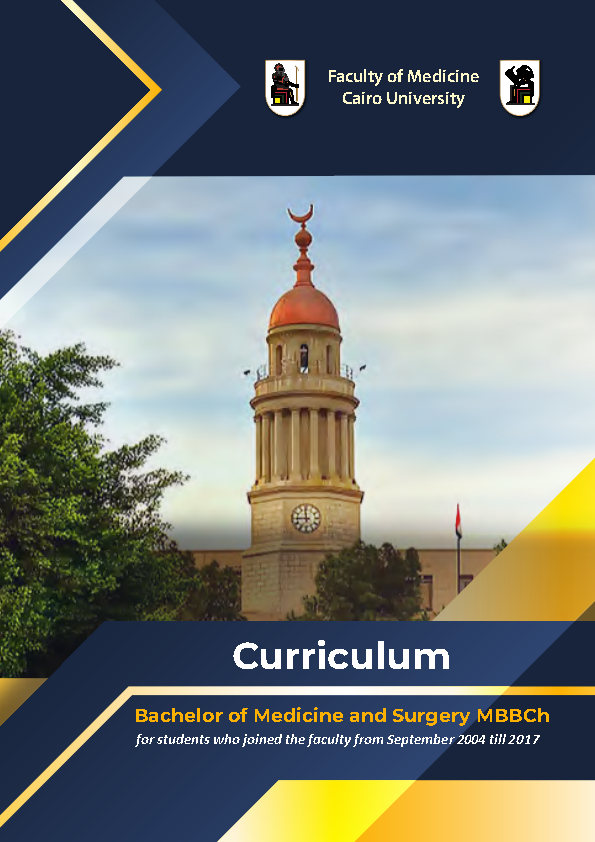Undergraduates Internal Regulations (en)
- Details
- Parent Category: Undergraduate Program
- Category: Regulations and Bylaws
Article Index
Item 13:
The head of the department is entrusted with putting down the written exams guided with the questions handed over by the professors who had already taught the course. He should take into account that the exam must be comprehensive. The exam should include a blend of the different types of written questions to measure the objectives stated in the curriculum. One professor or more should participate in putting down the exam, yet the head of the department must guarantee the exam secrecy. Also the head of the department has the right to send for professors from other national or international faculties for the oral and clinical exams if necessary.
Item 14:
Regulations of study and examination of The Pre-Clinical Stage:
The course of study in this stage is 30 weeks. The exam is held in 2 turns:
The first turn: In May.
The second turn: In September.
The University Council can modify the exam schedule and subsequently the number of study weeks at the recommendation of the Faculty council.
20% of the total marks are assigned for the attendance and formative exams (written, oral or practical exams) during the study period and according to the system recommended by the faculty council except for the English language, computer sciences and humanities and behavioral sciences as no formative exams are held for them.
The English Language, computer sciences and humanities and behavioral sciences are taught by the Faculty of Medicine’s staff members as much as possible. The grade of success for the English language and computer sciences is 50% each. Their marks are neither added to the academic year total marks nor the accumulative total marks.
If a student fails in either or both subjects, added to this humanities and behavioral sciences, he\she still can be promoted to the next academic year within the pre-clinical stage. The student should enter the exams of the first & second turns every year until he\she passes. The student is not promoted to the clinical stage unless he\she passes all what is studied in the pre-clinical stage.
4. If a student fails or misses not more than 2 medical subjects, he\she still can be promoted from the first academic year to the second academic year. The second academic year student is not promoted to the third academic year unless he\she passes all medical subjects. The third academic year student is not promoted to the clinical stage unless he\she passes all subjects studied in the pre-clinical stage.
5- 50% of the subject total marks are allocated for the written exam/ exams. So the distribution of marks is as follows: 50% for the written exam, 30% for the oral and practical exam & 20% for the formative exams.
Item 15:
Regulations of study and examinations of the clinical stage:
The course of study in the fourth year is 32 weeks.
The course of study in the fifth year is 44 weeks.
The course of study in the sixth year is 40 weeks.
The schedule of the beginning of study and the time of examination is as follows:
|
The year |
Beginning of study |
First turn exam |
Second turn exam |
|
Fourth |
mid of September |
June |
September |
|
Fifth |
mid of September |
July |
September |
|
Sixth |
mid of September |
November |
July |
Ø 20% of the subject total marks are allocated for the attendance and formative exams. All the scientific departments taking part in clinical teaching are responsible for it according to the allocated marks for each department on condition that the list of marks must be submitted from the subspecialty departments to the general department (internal medicine or general surgery) at the end of the year for preparation of the total mark list of the subject before being submitted to the control room in charge. The marks of the formative exam depend on the student evaluation during and at the end of the clinical round according to the schedule.
Ø 50% of the subject total marks are allocated for the written exam in all subjects. The distribution of marks is as follows: 50% for the written exam, 30% for the clinical and oral exam and 20% for the formative exams.
Ø In the clinical stage the student is not promoted to the next academic year unless he\she passes all subjects of the same academic year.
Ø In the subjects as (internal medicine & general surgery) that share with them in the educational process other subspecialty departments the following regulation must be followed :
Internal medicine :
A. Its curriculum includes other subspecialty branches according to the international standards such as cardiology, chest, tropical medicine, neurology, psychiatry, skin diseases, andrology, clinical and chemical pathology, diagnostic radiology, family medicine, oncology, intensive care, rheumatology, rehabilitation and physiotherapy.
B. The head of the internal medicine department is responsible for the supervision of the educational process and the examination.
C. The total marks of the clinical and chemical pathology is 40 distributed on the
written exam through the internal medicine written papers, practical and oral
exam.
D. The total marks of the skin and venereal diseases are 70 distributed as follows: 20 for the formative exams, 30 for the written final exam, and 20 for the clinical exam.
E. 20 marks are allocated for the formative exam of psychiatery medicine and in addition another 20 marks for a written exam through the final written papers of the internal medicine.
F. 10 marks are allocated for the formative evaluation of each of the following subspecialty:
Cardiology.
Chest diseases.
Tropical medicine.
Neurology.
Rheumatology & rehabilitation and physiotherapy.
General surgery:
Its curriculum includes the following subspecialties according to the international criteria such as: orthopedic surgery, urology, neurosurgery, anesthesia and emergency.
The general surgery department is in charge of teaching and examination. The head of the department of general surgery is responsible for the supervision of the educational process and exams.
50 marks are allocated for orthopedic surgery distributed as follows: 20 for the formative evaluation by means of the assigned department and 30 marks for a written exam through the general surgery written papers.
50 marks are allocated for the urology surgery distributed as follows: 20 for the formative evaluation by means of the assigned department, 30 marks for a written exam through the general surgery written papers.
E.20 marks of the formative evaluation are allocated for each of the following subspecialties:
Neurosurgery.
Anaesthia and intensive care.
F. Attendance should be satisfactory in the remaining subspecialty departments. Student will not be submitted for the final exam unless after satisfactory attendance according to the faculty council recommendations.














